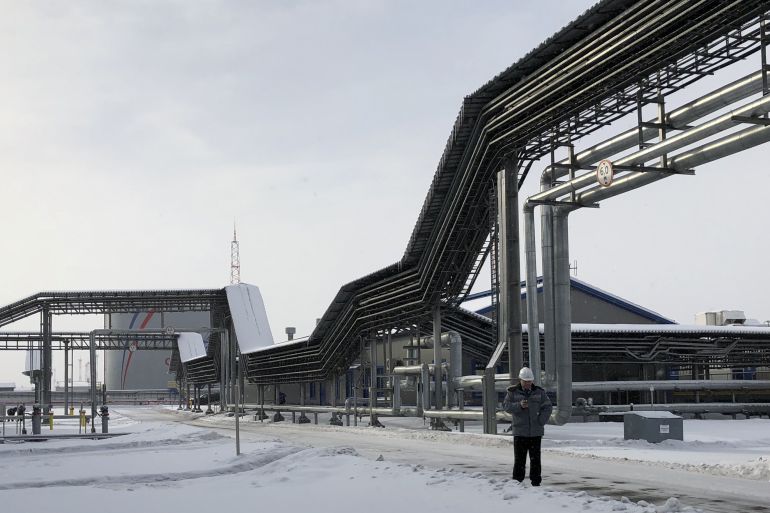Russia threatens to slash oil supplies in 2023, spooks markets
Moscow warns it may cut production by 5-7 percent in early 2023 as the energy war with the West deepens.

Russia may cut oil output by 5-7 percent in early 2023 and halt sales to countries supporting a price cap on its crude and oil products, a senior official has said.
Deputy Prime Minister Alexander Novak told state television on Friday that the cuts could amount to 500,000-700,000 barrels per day.
Keep reading
list of 4 itemsRussian oil price cap: Five things you need to know
Putin threatens oil production cuts over price cap
G7 price cap and ban on Russia’s seaborne oil kick in
His remarks marked the first in-detail Russian response to the recent price caps rolled out on Russian energy exports by Ukraine’s Western allies over Moscow’s invasion of its neighbour.
The European Union, G7 countries and Australia introduced a $60 per barrel price ceiling on Russian oil from December 5 on top of the EU’s embargo on imports of Russian crude by sea and similar pledges by the United States, Canada, Japan and the United Kingdom. The EU has also introduced restrictions on gas prices.
These moves are aimed at restricting Russia’s revenue streams while making sure much-needed energy exports do not come to a standstill.
Novak, however, said Moscow would ban sales of oil and oil products to countries that join the price cap and companies that demand its observance. Such a step would force those nations to source their oil from other countries. But if Moscow simultaneously cuts oil production, as Novak threatened, it would reduce the total volume of crude available in the market, pushing up prices of non-Russian oil, bringing pain to consumers globally — and potentially giving the Kremlin leverage against the West.
“We believe that in the current situation, it is even possible to take risks of lower production rather than be guided by the selling policy regarding the price caps. Today it is $60, tomorrow it can be anything, and getting dependent on some decisions made by unfriendly countries is unacceptable for us,” Novak said.
Prices rise on Russian threats
Novak’s comments on Friday led to what could prove a preview of things to come.
The threatened cutbacks sparked a rise in global oil prices of more than $1 fuelled by expectations of a drop in crude supply. Brent crude was up by 73 cents, or 0.9 percent, to $81.71 a barrel by 07:15 GMT, while US West Texas Intermediate (WTI) crude was at $78.40 a barrel, up 91 cents, or 1.2 percent higher.
They hit highs of $82.17 and $78.77, respectively, earlier in the session. Both contracts were on track to post a second weekly gain, with Brent up 3.3 percent and WTI up 5.5 percent.
“Crude prices are higher as energy traders focus on Moscow’s response to the price cap put on Russian oil,” Edward Moya, a senior market analyst at OANDA, a New York-based foreign exchange firm, told the Reuters news agency.
Russian President Vladimir Putin said on Thursday that he would issue a decree early next week detailing Moscow’s actions in response to the price cap.
Novak said Russia’s share of the global oil export market was currently 22 percent and that its share of the global gas export market was 20 percent, underscoring global dependence on Russian energy.
He added that despite Europe’s efforts to cut reliance on Russian oil and gas, energy exports from Russia are in demand worldwide and Moscow has been diversifying its buyers.
Novak also praised the work of the OPEC+ group of leading global oil producers, which includes Russia, saying the oil price is likely to remain in the current range of $70-$100 per barrel next year barring the emergence of unforeseen events.